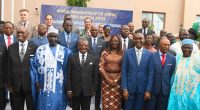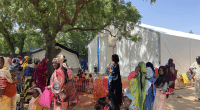Canada and the African Development Bank (AfDB) have signed a partnership agreement to combat the effects of climate change in Africa. The objectives of sustainable development and the economic empowerment of women are also the focus of future collaboration between the two parties.
The first results of the Afria Invest Forum held from November 7 to 9, 2018 in Johannesburg (South Africa) are already visible. Multidisciplinary and multi-stakeholder cooperation has just emerged between the Canadian government and the AfDB. The two institutions have signed an agreement, one of which is based on combating the effects of climate change and promoting green growth. For the AfDB, the collaboration also aims to “accelerate Africa’s agricultural transformation and improve access to energy and water in areas that are still underserved.” Canada signed this agreement through its Development Finance Institute, recognised under the FinDev Canada label. For the AfDB President, Akinwumi Adesina, the signing of the agreement bodes well for an “excellent partnership” between the two parties, the outcome of which will be beneficial to all. An opinion shared by FinDev Canada’s Investment Director. For Suzanne Gabouri, “the signing of this agreement marks the beginning of a promising collaboration for the sustainable industrialisation of Africa”.
The fight against climate change and its effects in Africa requires funding. However, the capital raised so far does not exceed 5% of the total amount needed. There is also a lack of meteorological information on the continent. There are 200 weather stations throughout Africa, but only half of them are functional. Ten African countries do not have them. However, the continent needs real-time meteorological data to better resist climate change.
The green economy in the spotlight in Africa
In recent years, Africa has distinguished itself by its ability to use natural resources to promote sustainable development. In 2017, a World Economic Forum report entitled Global Energy Architecture Performance Index ranked seven African countries among the 10 countries in the world with the highest percentage of renewable energy in their energy production. Ethiopia was at the top of the ranking with 93.90% use of green energy. Moving from fossil energy to renewable energy is becoming a priority for several African states. Morocco, for example, has set itself the target of producing 52% of its electricity consumption from renewable energies by 2030 and has succeeded in attracting investors to Africa.
Luchelle Feukeng







